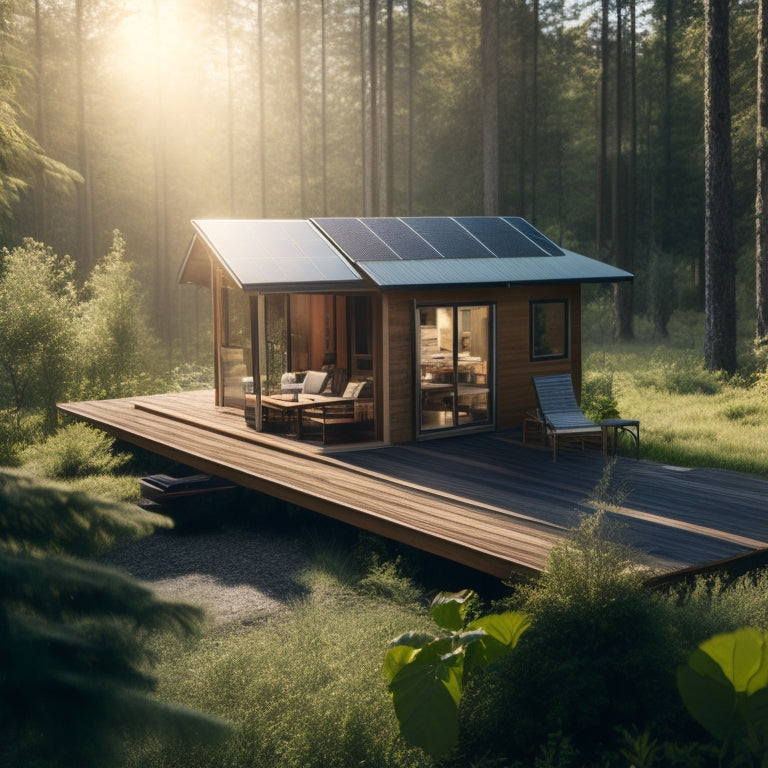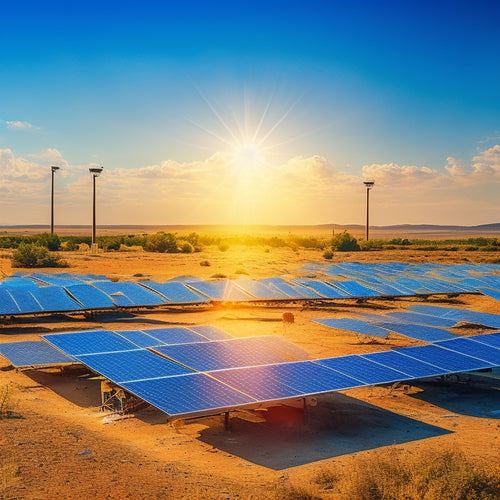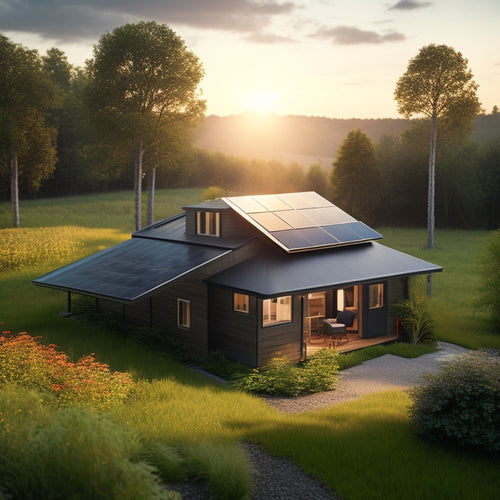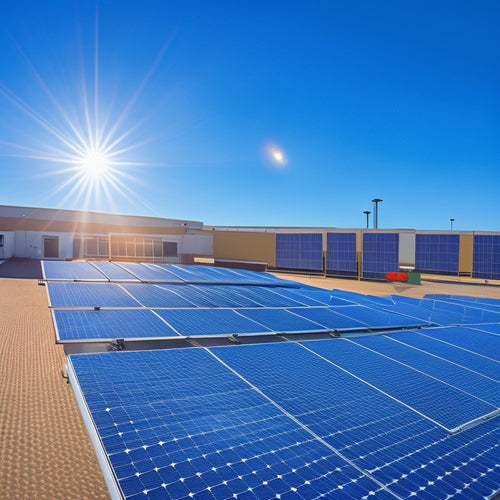
7 Top Solar Energy Systems for Remote Living
Share
You're looking to ditch the grid and live off the land, where energy independence is key. For remote living, you'll need a reliable solar energy system. Top systems for remote homes include those with advanced monitoring and control capabilities, energy-efficient appliances, and standalone power supply systems. To maximize energy storage, consider a solar battery bank that can handle excessive DOD. Look for systems with grid-scale batteries for large-scale storage and lead-acid batteries for smaller applications. Your path to self-sufficiency starts here - explore the best systems for your off-grid lifestyle.
Key Takeaways
• Choose a solar energy system that suits your off-grid cabin's energy requirements, considering factors like roof orientation and energy-efficient appliances.
• Select the right battery type, such as lead-acid or nickel-cadmium, based on your energy storage needs and tolerance level for deep discharging.
• Ensure your solar battery bank is large enough to store excess energy for use during low sunlight or at night, and consider cycle life and compatibility.
• Opt for a system with advanced monitoring and control capabilities to optimize performance, maintenance, and energy production and consumption tracking.
• Consider a grid-scale battery for large-scale storage and achieve energy independence and self-sufficiency with a tailored solar power system.
Renewable Energy for Off-Grid Homes
When starting a sustainable lifestyle off the grid, you'll likely rely on renewable energy sources to power your home, and solar energy systems are a popular choice due to their accessibility and decreasing cost.
As you initiate a sustainable lifestyle, energy efficiency becomes a top priority. Solar energy systems offer a reliable and eco-friendly solution to meet your energy needs. By harnessing the power of the sun, you can greatly reduce your carbon footprint and dependence on fossil fuels.
With advancements in technology, solar panels have become more efficient, durable, and affordable, making them an attractive option for off-grid homes. By incorporating solar energy systems into your renewable energy mix, you can enjoy a reduced energy bill, increased energy independence, and a clear conscience.
As you work towards a sustainable lifestyle, consider integrating solar energy systems into your off-grid home to maximize energy efficiency and minimize your environmental impact.
Solar Power Systems for Cabins
As you plan your cabin's energy infrastructure, contemplate installing solar power systems specifically designed for remote cabins, which can provide a reliable and efficient source of electricity.
These systems are tailored to meet the unique demands of wilderness living, where grid connectivity is limited or non-existent.
When designing your cabin's solar power system, it's crucial to take into account the cabin's energy requirements, considering factors such as lighting, heating, and appliances. A well-designed system will guarantee that your cabin remains powered throughout the year, even during periods of low sunlight.
Concerning cabin design, a south-facing roof orientation can maximize solar energy harvesting. Additionally, incorporating energy-efficient appliances and lighting can further reduce your energy needs.
Off-Grid Energy Storage Solutions
When it comes to off-grid energy storage solutions, you're faced with an essential decision: choosing the right battery type for your solar power system.
You'll need to take into account factors like depth of discharge, which affects the battery's lifespan, and cycle life expectancy, which determines how many charge/discharge cycles it can handle.
Battery Types Compared
You have several options for off-grid energy storage solutions, with different battery types suited to specific needs and applications. When selecting a battery, it's important to take into account factors like energy density, lifespan, and maintenance requirements.
For large-scale energy storage, grid-scale batteries like lithium-ion or flow batteries are ideal. These batteries offer high energy density, making them suitable for remote locations where space is limited. However, they often come with a higher upfront cost.
For smaller applications, lead-acid batteries are a more affordable option. While they've a lower energy density, they're well-suited for smaller systems and are relatively inexpensive. Additionally, they're widely available and have a well-established recycling infrastructure.
Other options like nickel-cadmium and nickel-metal hydride batteries offer a balance between energy density and cost. When choosing a battery, it's important to take into account your specific energy needs and select a battery that meets those requirements. By doing so, you can guarantee a reliable and efficient off-grid energy storage solution.
Depth of Discharge
What level of depth of discharge (DOD) can your off-grid energy storage system tolerate before battery life starts to suffer? This is a critical question, as excessive DOD can lead to premature battery aging. As a general rule, it's recommended to keep your DOD between 20% to 50% to guarantee a healthy battery life. Exceeding this range can reduce the overall lifespan of your batteries.
When you consistently push your batteries to 80% DOD or more, you'll start to notice a decline in their performance. This is because deep discharging causes internal resistance to increase, reducing the battery's ability to hold a charge. Over time, this can lead to a significant decrease in the number of charge cycles your batteries can handle. Fewer charge cycles mean a shorter lifespan for your energy storage system.
To mitigate this, consider implementing a battery management system (BMS) that monitors and controls the DOD. A BMS can help prevent over-discharging, making sure your batteries operate within a safe range. By doing so, you'll be able to maximize the lifespan of your energy storage system and maintain a reliable off-grid power supply.
Cycle Life Expectancy
Optimizing your off-grid energy storage system's cycle life expectancy requires a deep understanding of the delicate balance between battery durability and performance. You need to take into account the number of charge and discharge cycles your batteries can handle before they start to degrade. This is important because battery aging can greatly impact your system's overall performance and lifespan.
When selecting an off-grid energy storage solution, look for manufacturers that provide a thorough warranty period that covers the expected cycle life of the batteries. A typical warranty period for deep-cycle batteries ranges from 5 to 10 years, depending on the manufacturer and type of battery. During this time, you can expect the batteries to retain at least 80% of their capacity.
Remote Area Power Supply Systems
In remote areas where grid connection is unfeasible, standalone power supply systems emerge as a reliable solution for powering homes, farms, and communities. These systems are designed to provide rural electrification, ensuring power reliability in areas where traditional grid connection isn't possible.
As you consider remote area power supply systems, keep in mind the following benefits:
-
Increased energy independence: Standalone systems reduce reliance on external power sources, providing you with control over your energy needs.
-
Improved power quality: Remote area power supply systems can provide a stable and consistent power supply, reducing the risk of outages and power fluctuations.
-
Enhanced energy security: With a reliable power supply, you can focus on other aspects of your life, without worrying about energy availability.
- Environmental benefits: By harnessing renewable energy sources, you can reduce your carbon footprint and contribute to a cleaner environment.
Eco-Friendly Living With Solar Energy
By integrating solar energy systems into your remote living setup, you can significantly reduce your reliance on fossil fuels and lower your carbon footprint. This is an important step towards adopting a green lifestyle, which is vital for creating a sustainable future.
With solar energy, you can power your remote home, cabin, or cottage without harming the environment. You'll be using a renewable energy source that's abundant and clean, reducing your impact on the planet.
Solar Battery Banks for Homes
You'll need a reliable solar battery bank to store excess energy generated by your solar panels, allowing you to power your home during periods of low sunlight or at night. This is especially important for remote living, where grid connection may not be readily available. A well-designed solar battery bank ensures a steady supply of energy, even when the sun isn't shining.
When selecting a solar battery bank, consider the following key factors:
- Depth of discharge (DOD): A higher DOD means more usable energy storage capacity.
- Cycle life: A longer cycle life translates to a longer-lasting battery bank.
- Compatibility: Make sure the battery bank is compatible with your existing solar panel system and inverter.
- Monitoring and control: Look for a system with advanced monitoring and control capabilities for the best performance and maintenance.
For grid-tied systems, a solar battery bank can provide backup power during grid outages, while for off-grid systems, it's essential for continuous power supply.
With a reliable solar battery bank, you can enjoy uninterrupted power, even in remote areas.
Independent Living With Solar Power
As you consider living off the grid, you're likely drawn to the idea of energy independence - being able to generate and manage your own power without relying on public utilities.
With a well-designed solar energy system, you can achieve this independence, freeing yourself from the constraints of traditional energy sources.
Off-Grid Energy Freedom
With the ability to generate your own electricity, solar power systems offer a pathway to off-grid energy freedom, empowering you to live independently without reliance on public utilities. You can finally break free from the constraints of traditional energy providers and enjoy the peace of mind that comes with being energy self-sufficient.
Living off-grid doesn't mean sacrificing comfort or convenience. With a well-designed solar power system, you can:
- Power your wilderness retreat with clean, renewable energy
- Enjoy a rural lifestyle without relying on grid electricity
- Reduce your carbon footprint and minimize your impact on the environment
- Gain energy independence and reduce your reliance on public utilities
Energy Independence Now
By harnessing the power of solar energy, your independence from the grid is just a system design away, and a well-planned solar power system can catapult you into a life of energy self-sufficiency. With a customized solar energy system, you'll be able to generate your own electricity, reducing your reliance on traditional energy sources and giving you the freedom to live life on your own terms. This means you'll have the Energy Freedom to power your home, cabin, or remote dwelling without being tied to the grid.
A well-designed solar power system can provide a Sustainable Lifestyle, allowing you to live in harmony with the environment while still enjoying the comforts of modern living. By leveraging the power of the sun, you'll be able to reduce your carbon footprint, minimize your energy costs, and enjoy the peace of mind that comes with energy independence.
With the right system, you'll be able to power your appliances, lights, and devices, all while living off the grid. Say goodbye to energy bills and hello to a life of Energy Freedom and sustainability.
Self-Sufficiency Made Easy
You can achieve self-sufficiency with a solar power system that's tailored to your energy needs, allowing you to live independently without relying on public utilities. This means you can enjoy the freedom to live in rural areas, embracing a sustainable lifestyle that's in harmony with nature.
With solar power, you can generate your own electricity, collect and conserve rainwater, and even grow your own food. This level of self-sufficiency is especially appealing to those who value independence and want to reduce their carbon footprint.
Some benefits of self-sufficiency with solar power include:
- Reduced reliance on public utilities, giving you more control over your energy costs
- Increased energy independence, allowing you to live off the grid
- A reduced carbon footprint, contributing to a more sustainable future
- The freedom to live in rural areas, surrounded by nature and tranquility
Frequently Asked Questions
Can I Install Solar Panels on a Metal or Asphalt Roof?
'Did you know 80% of commercial buildings are suitable for solar panels? You can install solar panels on a metal or asphalt roof, but make sure the roof condition is sound and panel placement is optimized for energy efficiency.'
How Often Should I Clean My Solar Panels for Optimal Performance?
You should clean your solar panels every 6-12 months to maintain peak performance, as dirt accumulation reduces energy output by up to 25%; regular panel maintenance guarantees maximum energy harvest and prolongs system lifespan.
Are Solar Energy Systems Compatible With Septic Systems?
You might worry that solar energy systems will interfere with your septic system, but rest assured, they're compatible. In fact, septic regulations emphasize water conservation, which solar energy supports by reducing your water treatment needs.
Can I Use Solar Power to Charge My Electric Vehicle?
You can charge your electric vehicle using solar power, leveraging vehicle charging systems that integrate with energy storage solutions, ensuring a reliable and sustainable energy supply for your transportation needs.
Do Solar Panels Work Efficiently in Shaded or Cloudy Areas?
When you think solar power, you envision sunny skies, but do solar panels work efficiently in shaded or cloudy areas? On cloudy days, energy output drops, and shade analysis is important to optimize performance, but advanced panels can still harness some energy, albeit reduced.
Related Posts
-

What Happens Without a Charge Controller in Solar Panels
Without a charge controller in your solar panel system, you risk overheating batteries due to overcharging, which can...
-

Diy Off Grid Solar
By embracing DIY off-grid solar, you can break free from grid dependence, slashing your energy bills by up to 90% and...
-

Essential Solar Panel Mounts for Commercial Properties
When it comes to essential solar panel mounts for your commercial property, durability and wind resistance are key fa...


